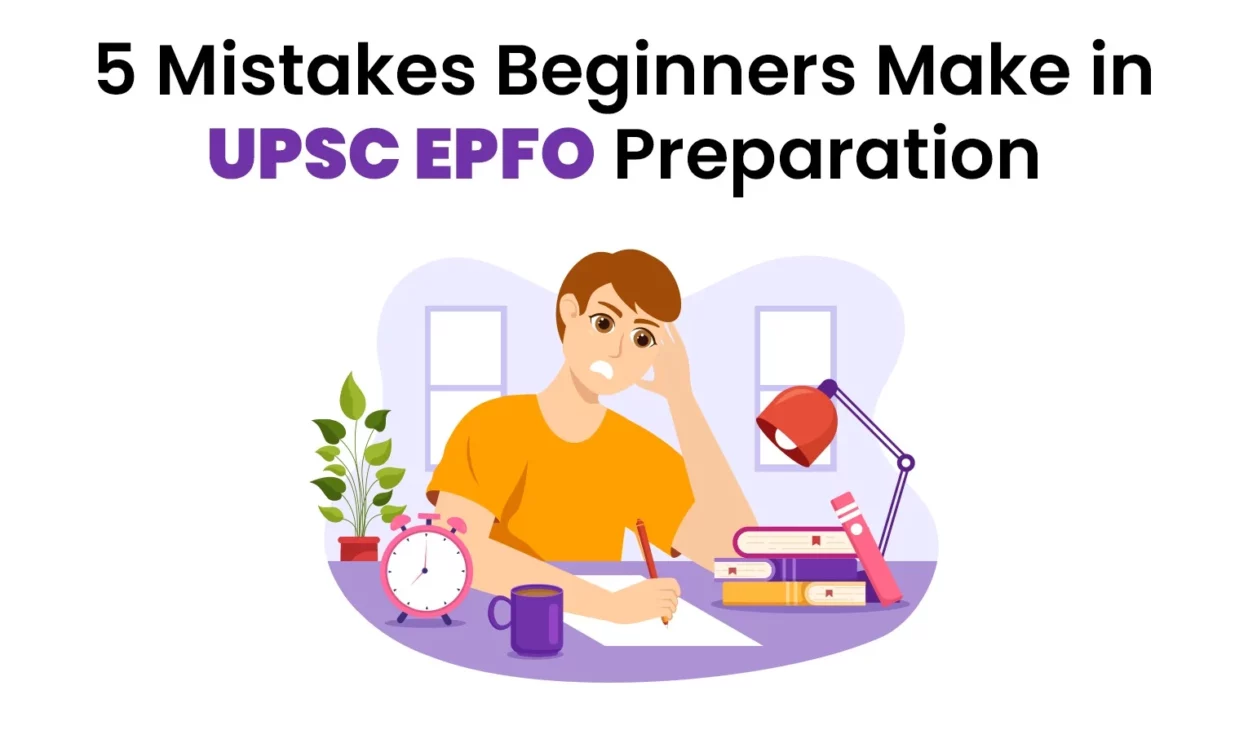Cracking the UPSC EPFO exam required careful planning, consistent effort, and a customized preparation strategy. Many beginners, unknowingly, make some common mistakes that can hinder their progress. Identifying and avoiding these mistakes early in your preparation can help you increase your chances of success.
In this article, I’ll share the 5 most common mistakes that most aspirants commit and learn the hard way by wasting their attempts. Learn from their experiences and avoid making them in your own preparation.
1. Underestimating the Syllabus and Exam Pattern
One of the most common mistakes is failing to thoroughly understand the UPSC EPFO syllabus and exam pattern. Many aspirants immediately start preparing without a clear plan, leading to wasting their time and efforts.
Ignoring the Detailed Syllabus
The UPSC EPFO syllabus is indicative in the official notification; you need to analyse the previous year’s question papers to note down the list of exact topics.
Lack of Familiarity with the Exam Pattern
The EPFO exam has a set pattern; the total number of questions, total marks, negative marking, duration, etc. Not knowing this can lead to poor time management during the exam and a lack of strategic planning during your preparation.
Not Analyzing Previous Year Papers
Previous year question papers offer invaluable insights into the difficulty level, the type of questions asked, recurring question patterns, and more. Beginners who skip these miss a chance to understand what the exam really needs and plan their study better.
2. Neglecting Basic Concepts
Another common mistake is ignoring the basic concepts. The UPSC EPFO exam covers subjects like English, Maths, Reasoning, General Knowledge, Economics, Industrial Relations & Labour Laws, Governance and Constitution of India, Computers, and more. Beginners often rush to learn hard stuff without creating a strong base.
Skipping Basic Books (like NCERTs)
For subjects like Indian Economy and General Knowledge, the NCERT books are really important for understanding the basics. Skipping them might lead to a shallow understanding, making it tough to handle harder topics and questions that apply what you’ve learned.
3. Lack of a Practical Study Plan and Consistency
Another trap is not having a realistic study plan. Moreover, beginners often start with enthusiasm but fail to maintain a disciplined and organized approach. Without a well-defined study plan and consistent effort, even the most dedicated aspirants can lose their way.
No Realistic Timetable
Studying without a timetable can lead to procrastination and an uneven distribution of time across different subjects. This can result in spending too much time on some subjects while ignoring others.
Inconsistent Studying
Consistency is key to effective preparation. Irregular study habits and long breaks can disrupt the effective learning process and make it difficult to retain information. So, maintain consistency in your studies by setting daily and weekly goals.
Unrealistic Goals
Beginners sometimes set unrealistic daily or weekly targets, which leads to demotivation when they fail to achieve them. Hence, it is important to set achievable goals, regularly review your progress, and make adjustments to your plan as needed.
4. Ignoring Revision and Practice
Another big mistake is skipping revision and practice. Just reading the study material isn’t enough to crack the UPSC EPFO exam. You need to regularly review what you’ve learned and practice questions. Beginners often miss these important steps.
Not Revising Regularly
It’s easy to forget what you’ve studied if you don’t go over it again. Beginners often just focus on learning new things and don’t take the time to review old topics. Make sure your study plan includes regular time for revision. Set aside specific times to go back over what you’ve already studied.
Not Enough Practice
Solving multiple sectional and full-length mock tests is essential for understanding the application of concepts and improving time management skills. Beginners who skip practicing questions and mock tests often find it tough to answer questions under pressure in the real examination. You should regularly practice as many mock tests as you can to assess your preparation level and improve your speed and accuracy.
Not Analyzing Mistakes
Some aspirants simply attempt practice questions but fail to dedicate sufficient time to analyse them. It’s crucial to analyze your mistakes as it helps you identify your weak areas, allowing you to focus on your weak areas.
5. Neglecting Health and Well-being
The UPSC EPFO preparation journey can be demanding, and beginners sometimes get so involved with their studies that they often neglect their physical and mental well-being. This can lead to burnout and negatively impact their preparation.
Poor Diet and Sleep Schedule
An unhealthy diet can make it harder to concentrate, remember things, and stay productive while studying. Therefore, prioritize eating a balanced and nutritious diet to fuel your brain and body for effective learning.
Irregular Sleep Schedule
Not sleeping enough or having an irregular sleep schedule disrupts your focus, memory, and overall energy levels needed for effective preparation. Establish a regular sleep routine to ensure your mind is well-rested and can absorb information effectively.
Lack of Physical Activity
Sitting for long hours studying can lead to physical discomfort and make you feel tired. Regular exercise is key to boosting your energy and lowering stress.
Ignoring Mental Health
The pressure of exam preparation can be stressful. If you ignore feelings of stress and anxiety, it can be much harder to focus and learn effectively. Take regular short breaks to refresh your mind and consider stress-management techniques to maintain a healthy mental state. Remember, a healthy mind supports effective learning.
Conclusion
Avoiding these five common mistakes can significantly enhance your UPSC EPFO preparation journey. If you understand the syllabus and exam, build a strong base, have a study plan, revise and practice regularly, and take care of yourself, you’ll handle the early challenges much better and have a higher chance of passing this important exam. Remember, studying consistently, planning well, and staying positive are key to your success. Good luck!

Lexy Summer is a talented writer with a deep passion for the art of language and storytelling. With a background in editing and content creation, Lexy has honed her skills in crafting clear, engaging, and grammatically flawless writing.



